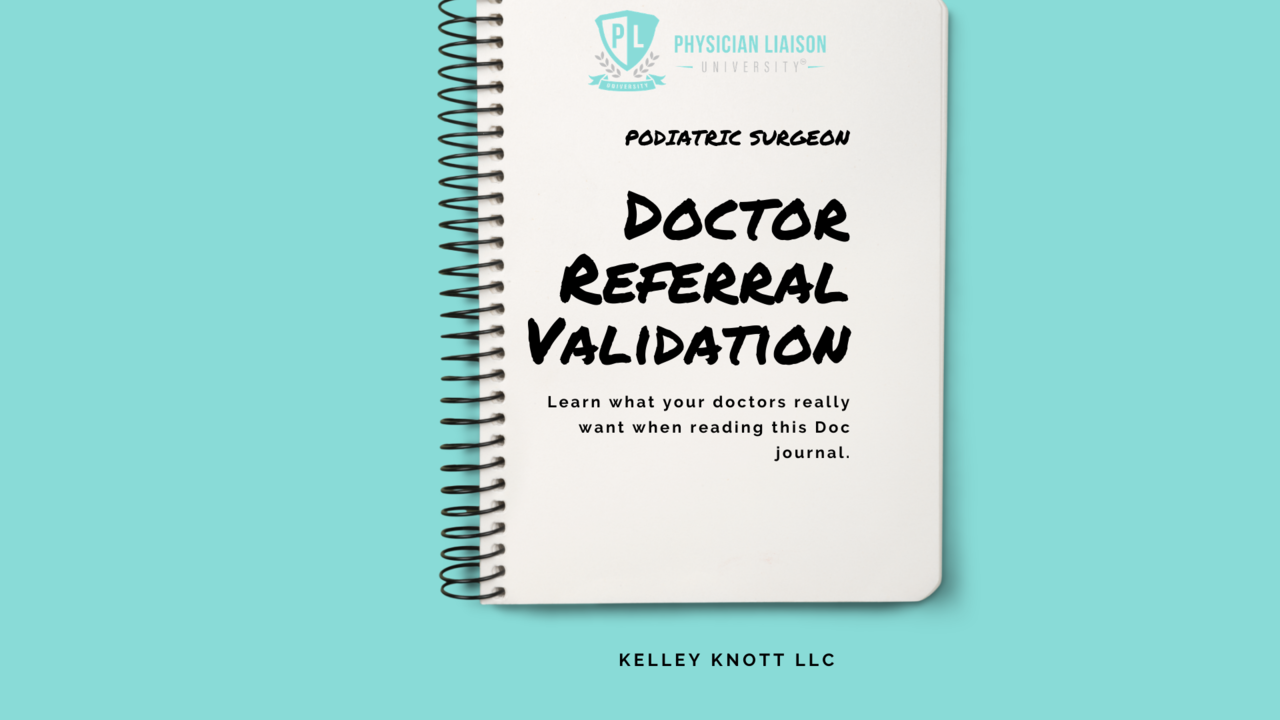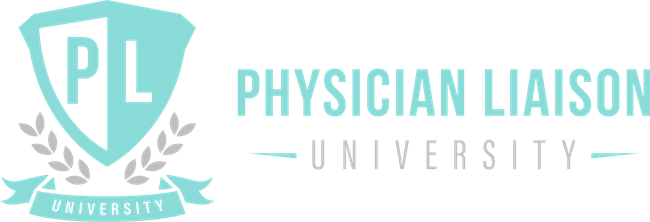Podiatric

We conducted validation interviews with doctors to find out their feedback and thoughts regarding Physician Liaisons. They provided insightful responses that will surely help better our services and what we can do for their practices.
Here are the questions that were asked:
1. What are the top specialties you refer out to most (ortho, OBGYN, Pain, ENT, etc), and for what (conditions/symptoms/treatment)?
2. Besides excellent patient care, when referring to a physician, what factors help you make that decision to send to that physician or practice? (examples: cell phone number, them meeting, you face to face, location, etc)
3. Is there something a physician liaison or medical rep that stands out to you in a positive or negative way, and why?
4. If a physician liaison comes to your practice to discuss building a patient-referring relationship between you and their specialists, what can they say/ do that would provide value for you or your staff?
5. What is the greatest value a physician liaison would be able to provide to your practice?
Written Validation Interview:
Dr. Hawyan C.
1. For me, I do only limb salvage, so I refer back mostly to PCP to manage diabetes, especially for patients that don't have their blood sugars under control. Second would be pain management which is hard to find.
2. Really a streamlined referral process is what I look for, and as long as patients don't complain about them being a terrible doc, having good bedside manners is important
3. Have not used one before, we use reps for hardware and as long as they are reliable that is what I ask for
4. I'm not sure, haven't used one before
5. Not sure
Dr. Gennedy K.
1. Neurology, pain management, spine, ortho.
2. I use people I've met before
3. We have a great rep at Hoag hospital. They have made wonderful connections
4. Not much. We get referrals from urgent care and primary. If it has a foot or ankle problem, send it. Wounds, send it.
5. Increases revenue
Dr. Nathaniel G.
1. Vascular (PVD and arterial studies) endocrinology (diabetic management) primary care (overall health) and infectious disease (IV antibiotic therapy)
2. Face to face, location, level of care provided.
3. Positive: level of knowledge, personality. Negative: arrogance
4. Give tips on how to increase patient load and be willing to assist
5. From the outside view, I think it’s important for a liaison to not be biased.
Dr. David Y.
1. Ortho for knee pain
2. Location and reputation
3. Accountability
4. Ease of use
5. I usually use my nurses for this.
Dr. Vilayvanh S.
1. Pain specialist/interventional pain specialist for complex regional pain syndrome, peripheral neuropathy, chronic pain, or for pain MGM when I will be performing reconstructive foot and ankle surgery.
Vascular or endovascular surgery for patients with PAD/PVD and there are ulcers to heal or if I plan on doing surgery and want to establish better circulation.
Neurology for EMG, NCV, diagnosis of neuromuscular diseases
Orthopedic surgery for knee, hip, back, shoulder, elbows (any other joint not related to the foot and ankle - my specialty).
PCP for surgical/medical clearance; diabetes control
Endocrinologist for diabetes control
Rheumatologist for RA, SLE, Psoriatic arthritis work up or treatment
2. Consistent correspondence with our office on patient care (sending in consult note, lab work, friendly and personable staff to my staff)
Insurance plans
3. Being courteous and friendly with staff is positive
Being rude, hard to correspond with or get a hold of in a timely manner is negative
4. Provide information up front on insurance plans they do NOT take
Provide information on what they treat or what they can offer that is different than the typical specialist office related to their field
Provide referral forms for the office to fill out
5. More new patients and referrals that can work both ways
Dr. Dominik M.
1. Most frequently are infectious disease and vascular/interventional radiology. I do a lot of wound care and these specialties play a big role in that.
2. Biggest reason for me is open lines of communication. That typically means having one another’s cell #, but can be by other means of secure text. Not having to go through 2-3 people to ask the doc a question is very helpful.
3. Medical reps/physician liaisons can walk a fine line between being available and “too available”. Information is important but sitting around our office all afternoon talking with our staff can interfere with clinic time. So finding that balance is important to me.
4. To me the important things for our patients are availability and access. If my patients have to wait 4 weeks to get in and drive 1 hour to get there we probably won’t use you.
5. Introduction to the physician either in person or via phone/email. Helping to establish that relationship is important.
Dr. Patrick N.
1. Vascular Surgeon: Vascular Testing, improve circulation ( endovascular or surgical bypass, pre-operative evaluation to see if they will heal, claudication, diabetics, peripheral ulcer disease, venous insufficiency, lymphedema.
Infectious disease: Post-op infections, diabetic foot infections, osteomyelitis, chronic foot ulcers, organisms that require IV antibiotics.
Rheumatologists: Evaluation and management of chronic pain secondary to severe arthritis.
Physical therapists: Soft tissue injuries ( tendonitis, capsulitis, etc.), weak or tight muscles causing gait abnormalities, post-operative adhesions.
2. Proximity to the patient. Insurance accepted. Good personality/empathy. Good communication with patients and with our office. Respect and collaboration with me (don't steal the patient).
3. Making sure we have referral forms for their office.
4. List of insurance panels they participate in. Hours of operation. Philosophy of patient treatment. Working as a team for the benefit of the patient. Follow up reports or notes. If planning procedures, what and when.
5. Able to act as a liaison between both practices and to voice any concerns that I may have back to their practice. Keeping lines of communications open between the physicians especially if there may be "issues"!
Dr. Nick G.
1. Vascular surgery
2. Meeting them and quality of care
3. Someone who is not pushy but keeps in touch about there product or service often
4. Meeting with the referring group
5. Referral base and meetings with referral groups
Dr. Jalpen P.
1. I mostly refer my patients to either vascular surgery/interventional cardiology for PAD issues or pain management for patients with chronic pain
2. I would say having an existing relationship with a physician either by having a shared patient at the hospital or having had a face to face and being able to communicate via cell phone.
3. Liaison who stands out in a positive way would be someone who finds out the practice needs and the type of patients we treat prior to discussing the referrals.
4. Patient-referring relationship is a 2-way street in my opinion so I feel that when a liaison is asking for our practice to send out referrals, as part of a thriving professional relationship, we expect the same courtesy in return.
5. Being in constant touch to maintain the referrals and physician relationship.
Dr. Josephine L.
1. I am in a specialty (podiatry) so I tend to refer back to primary care, or mostly to vascular, endocrine, or pain management. Neuro every once in a while.
2. Location is often big for patients, also staying in their insurance network. I like to refer to people I’ve met or who refer me, patients. It goes a long way when people say how nice their doctor is.
3. I like to work with reps that are friendly and answer my texts, but who aren’t pushy. I don’t want to be bugged about when I will use their very niche product. (Product reps). I can’t say I’ve worked with physician liaisons directly, but I would imagine similar modes of conduct would apply
4. A positive introduction and coming at a time when I’m not overwhelmed. They should have plenty of business cards ready to go (for the physician they represent and themselves) also I still like to meet providers, so if they came with a list of available times to meet a provider, then I just choose one, that would be great.
5. Because I work in specialty medicine and in private practice, having PCP's know who I am and remember to refer out to me is a great asset.

